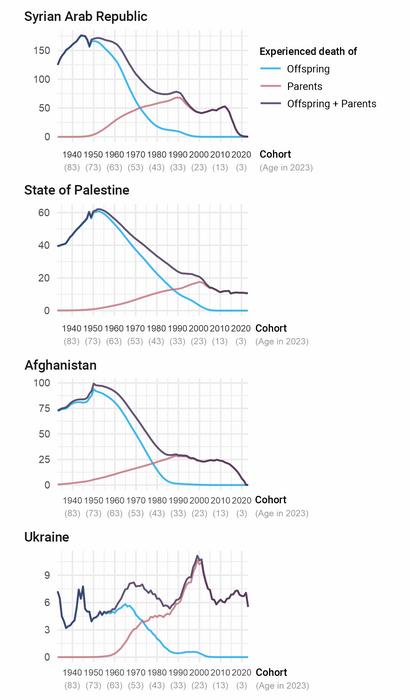Armed conflicts claim more lives every day. The number of those mourning the lives loss to conflicts is an even greater number. What are the implications of a growing population of mourners, and how long will this grief persist in war-torn societies? In a recent study, researchers from the Max Planck Institute for Demographic Research (MPIDR), the CED – Centre for Demographic Studies, and the University of Washington examined the extent of conflict-related bereavement among immediate family members -parents and children- in a subset of countries experiencing high-intensity armed conflicts. The researchers also predicted how long and how intensely this bereavement is likely to persist in the population.

Credit: MPIDR
Armed conflicts claim more lives every day. The number of those mourning the lives loss to conflicts is an even greater number. What are the implications of a growing population of mourners, and how long will this grief persist in war-torn societies? In a recent study, researchers from the Max Planck Institute for Demographic Research (MPIDR), the CED – Centre for Demographic Studies, and the University of Washington examined the extent of conflict-related bereavement among immediate family members -parents and children- in a subset of countries experiencing high-intensity armed conflicts. The researchers also predicted how long and how intensely this bereavement is likely to persist in the population.
“When demographers study conflicts and wars, the focus is often how many people die, who the victims are, and how that affects things like life expectancy. The number of people who die in a conflict becomes a measure of its intensity,” explains Diego Alburez-Gutierrez, author and leader of the Kinship Inequalities Research Group at MPIDR. “But the human cost of war overlooks a critical aspect of the human cost. For every person killed, there are relatives and friends who survive and grieve those deaths. These survivors are impacted by these traumatic experiences for the rest of their lives.”
The researchers aimed to quantify how common it was to experience the death of a child or a parent to war across 16 countries suffering the highest population loss due to conflicts from 1989 to 2023. They used data from the United Nations World Population Prospects, the Uppsala Conflict Data Program database, the United Nations Office for the Coordination of Humanitarian Affairs, and the B’Tselem project.
The enduring impact of war
The study highlights the most lethal conflicts of the recent years: Syria, the State of Palestine, Afghanistan, and Ukraine. “We find that these populations will experience considerable levels of bereavement regardless of how these conflicts evolve in the future,” says Alburez-Gutierrez.
He draws two main conclusions: “If we focus only on deaths, we overlook a vast part of the population scarred by the loss of loved ones. The number of mourners far exceeds the number of fatalities”, he explains. For instance, on average, each conflict death leaves more than two relatives (parents and/or children) bereaved in Ukraine, more than 3.5 in the State of Palestine, and roughly four in Syria and in Afghanistan. By the end of 2023, an estimated one out of every 67 Palestinians had lost one offspring to the conflict over the course of their lives, one in every 20 individuals in Syria, in Afghanistan, one in every 65 individuals, and one in every 200 in Ukraine, on average.
The projections for the future reveal another crucial finding: high levels of bereavement will remain even if all armed conflicts were to end immediately. “Looking ahead to 2050, even in a scenario in which there were no more conflict deaths after 2023, we estimate that one in every 142 Palestinians alive in 2050 will have ever experienced the death of one parent to conflict, and one in 200 the death of a child,” explains Emilio Zagheni, Co-author and Director of the MPIDR. “In populations with high youth conflict mortality, such as in the State of Palestine, a significant number of bereaved parents aged 30 and older will carry the trauma of losing a child for the rest of their lives. In settings where combatant or older-age mortality is higher, such as in Ukraine, a large population of orphaned children will go through their lives with the scar of having lost a parent,”
“Longer and more lethal conflicts create larger populations of bereaved relatives. This has substantial negative impacts on the mental and physical health of survivors, reduces available emotional and economic support during critical life stages, and fosters adherence to extreme ideologies that hinder social and political reconciliation,” adds Enrique Acosta, Co-author and researcher at the CED. “Our estimates of the population of individuals left bereaved by war can help design policies to support different groups of mourners based on their gender and age. Tailoring interventions to the needs of specific demographic groups is crucial for effective support.”
Journal
Science Advances
Article Title
The long-lasting effect of armed conflicts deaths on the living: Quantifying family bereavement
Article Publication Date
26-Jul-2024



